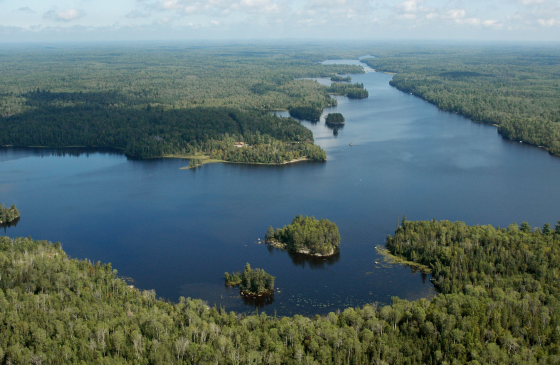Ely, MN-- This week, the Boundary Waters Permanent Protection Bill (S.F. 167/H.F. 329) was introduced in both the Minnesota House and Senate by chief authors Representative Sandra Feist and Senator Kelly Morrison. The bill extends the existing permanent state ban on mining in the Boundary Waters Canoe Area Wilderness (BWCAW) to also prohibit sulfide-ore copper mining on state-owned lands and issuance of sulfide-ore copper mining permits, licenses, and leases within the Rainy River Headwaters.
“The Boundary Waters Canoe Area Wilderness is recognized the world over for its pristine waters, unique ecosystems and stunning beauty. Let’s permanently protect this watery wilderness before it’s too late and we’ve lost it forever,” said Senator Kelly Morrison.
“I am thrilled to be the chief House author of the Boundary Waters Permanent Protection Act. Passing this bill is essential to protect the economic, recreational, and ecological gem that is the Boundary Waters Canoe Area Wilderness. I’ve experienced the adventure of exploring the Boundary Waters with my family and want to ensure that all Minnesotans have the same opportunity for generations to come,” said Representative Sandra Feist.
Allowing copper mining in the headwaters of BWCAW would forever degrade the Wilderness’ ecosystem and landscape and result in polluted water and air, industrial-level noise, loss of habitat and wildlife, and damage to the regional amenity-based economy, all in violation of existing state and federal laws that mandate permanent protection of the BWCAW from such harms. The bill only applies to sulfide-ore copper mining and does not prohibit or otherwise impact existing or future taconite, iron ore, sand, gravel, and granite mining.
“The Boundary Waters is the wrong place for toxic sulfide-ore copper mining. Allowing this type of hard rock mining in the headwaters of the Wilderness would forever degrade this landscape,” said Ingrid Lyons, Executive Director of Northeastern Minnesotans for Wilderness, which leads the Campaign to Save the Boundary Waters. “The Boundary Waters Permanent Protection Bill provides the best solution for protecting this one-of-a-kind Wilderness by prohibiting sulfide-ore copper mining on state lands in the Boundary Waters headwaters.”
The Boundary Waters Permanent Protection Bill closes a critical gap in existing state and federal statutes that mandate the permanent protection of the BWCAW from any pollution, ecosystem alteration, and risk of degradation to its air, water, forested landscape, or other natural conditions.
Since the 1970s, these existing statutes have permanently banned all mining inside the BWCAW. However, sulfide-ore copper mining in the upstream headwaters of the BWCAW fails to protect the BWCAW from the irreversible damage and environmental degradation that would result from sulfide-ore copper mining on lands adjacent to the Wilderness and along lakes and rivers that flow directly into the BWCAW’s interconnected water system. To permanently protect the Wilderness, the Boundary Waters Permanent Protection Bill extends the existing state ban on mining in the BWCAW to also prohibit sulfide-ore copper mining on state-owned lands and bans the issuance of sulfide-ore copper mining permits, licenses, and leases within the Rainy River Headwaters portion of the Boundary Waters watershed.
Nearly 70 percent of Minnesotans support permanent protection for this priceless Wilderness area. A poll conducted by Change Research of Minnesota midterm voters finds that 7 in 10 (69%) support legislation to permanently protect Minnesota's Boundary Waters Canoe Area Wilderness from the threat of sulfide-ore copper mining. The poll of 1,098 2022 Minnesota voters from November 7-10, 2022 found that support for permanent protection ran high across all demographics and every region of the state.
A vast collection of peer-reviewed science shows that if a Twin Metals mine was built along the rivers and streams flowing into the Wilderness, pollution and environmental degradation would be certain. A peer-reviewed independent study from Harvard University showed that protection of the Boundary Waters from the proposed sulfide-ore mine would result in dramatically more jobs and more income over a 20-year period.
The Boundary Waters Permanent Protection Bill expands the existing ban on mining within the BWCAW to include the entire Rainy River Headwaters, of which the BWCAW is the downstream 50%. The Bill is supported by the Minnesota Pollution Control Agency's 2017 Rainy River-Headwaters Watershed Monitoring and Assessment Report, which describes the waters within the Headwaters as “immaculate." The Report concludes that "the majority of the waterbodies within this watershed had exceptional biological, chemical, and physical characteristics that are worthy of additional protection."
###
